They say a picture tells a thousand words, and it was indeed an image to be imprinted on the hearts of all who attended St Jude’s fourth Form 6 Graduation: the sight of 70 Form 6 students, raising their arms in triumph and celebration at Smith Secondary Campus on May 26.
They have reached a milestone which is unattainable for many young people in Tanzania – graduating from secondary school.
The Class of 2018 joins the ranks of 325 bright, young leaders who have successfully graduated from The School of St Jude since 2015, venturing into the world as the moral and intellectual leaders of tomorrow.
In the words of School of St Jude Board Chairwoman, Bibiana Mardai, “our graduates paint the most beautiful picture of Tanzania’s future.”
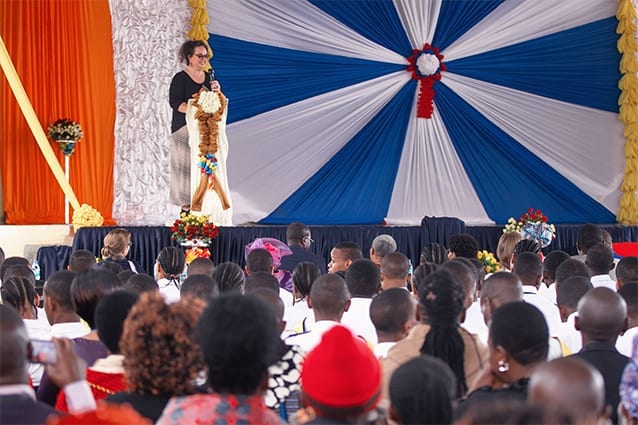
St Jude’s Founding Director, Gemma Sisia, honoured students and all supporters who have given them a hand up throughout 13 years of education.
“It is thanks to good people from all around the world that this day is made possible for our Form 6 graduates,” Gemma insisted.
“The Class of 2018 hold all the tools they’ll need to reach their ambitions and make a difference in Tanzanian society,” she said.
Thousands of generous supporters who make education possible for all our students, were represented by 38 sponsors, donors and visitors from the international community in attendance at the Graduation Day ceremony.
Guest of Honour, Dr Richard Masika, Board Director for The School of St Jude, stirred the crowd with a powerful message for the graduating class, encouraging them to look towards the road ahead.
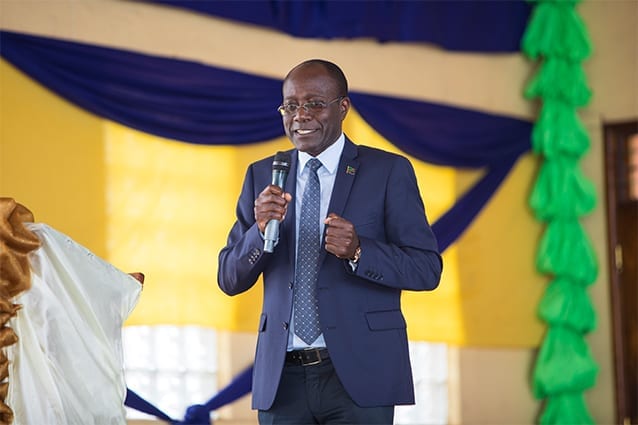
“Students are harvesting the fruits of their hard work. Finishing secondary education prepares you for the future. But, it is important to remember that finishing school does not mean the end of the road. It is the end of one stretch and the beginning of another,” he began.
“Be patient in reaching success. To whom support is given, support from them towards others is expected. Remember your responsibility to support your family, your community and Tanzania.”
Another highlight from the day was a passionate address from Christina, 2017 school captain and 2018 graduate, who reflected on her time at St Jude’s with insight and gratitude.
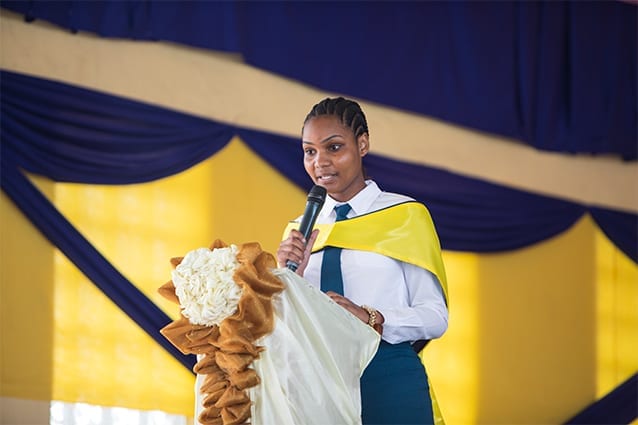
“Academically, we have competed against the best schools in Tanzania. With the help of our teachers, we have worked diligently. We hope we pass our exams with flying colours, proving our efforts and achievements.”
“We have learnt essential leadership skills. We have the knowledge to face the problems in our community as we go out in to the world."
"Our school values of Respect, Responsbility, Honesty and Kindness, have helped us become the leaders we are. Thank you, St Jude’s, for growing our hearts and our minds,” Christina said.
Monica Hart, a long-time School of St Jude sponsor, spoke straight from the heart to our graduates.
“You are a true example of what you can achieve once the opportunity presents itself. You have proved that you are capable of reaching the heights that were once so unattainable. As sponsors, it is with such happiness that we take you into our lives, we take pride in your work ethic, how you face your daily struggles, and your abilities to succeed.”
“The way your parents felt when you were accepted – well that’s how we felt when we were given your name.”
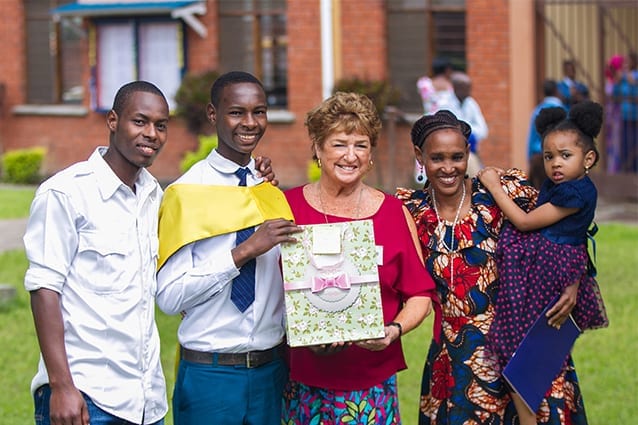
“I met Mama Gemma 20 years ago, at my first Rotary conference and she was one of the guest speakers. There were over 1,000 Rotarians in attendance. There she stood, this one young girl, and she spoke from her heart. She had no money to build a school, faced many hurdles, but did she ever give up? No, she held her head high and look where we are today,” Monica shared.
Where we are today was unprecedented when The School of St Jude opened in 2002.
We are educating 1,800 students, with a cohort of 395 graduates, and hundreds of alumni who have already given back through participation in the Beyond St Jude’s Community Service Year, teaching 30,000 students in Tanzanian government schools.
Our achievements so far are a testament to the combined effort of thousands of people worldwide, who take our students’ hands and lead them through the gateway to a bright future.
What are you waiting for? Give us a hand and in turn, you’ll give young Tanzanians a chance to succeed. Donate or sponsor today.
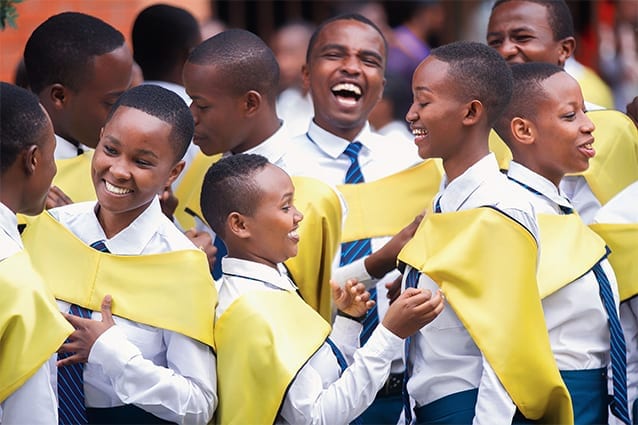
Note: quotes have been amended in parts for clarity.
St Jude’s students are testament to what young people can accomplish when afforded strong educational foundations and the resources and tools to excel.
Winning international awards and receiving commendations from world leaders, our students are already realising the School’s vision to educate the future leaders of Tanzania.
St Jude’s educates over 1,000 students from Form 1 through to Form 6 at the Smith Secondary Campus, all have the potential to be future leaders within their community and many dream of doing just that.
Form 1 students are at the very beginning of their journey into secondary level education. This is itself an achievement – only an estimated 12% of the adult population (over the age of 25) in Tanzania have received a secondary education.
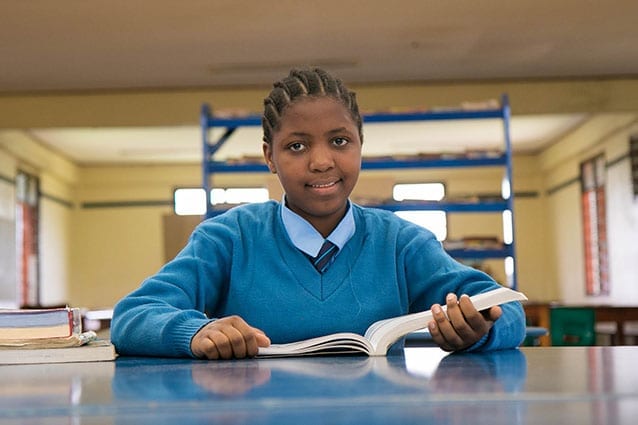
Their journey is made possible through the generous and unwavering commitment of sponsors who cover the costs of a student’s academic scholarship for a minimum of three years, and ideally for a student’s entire education with St Jude’s.
“Sponsoring an academic scholarship for a student is an incredibly rewarding experience” says St Jude’s Founder, Gemma Sisia.
“For our students, securing an education at St Jude’s is a pivotal moment in their lives, opening up opportunities that they otherwise wouldn’t have access to."
“It’s especially crucial for the 40 or so new students who join us in Form 1 from government primary schools. Secondary school is a really fundamental time in a student’s education and development. Knowing that there is someone investing in their future has a profound and empowering effect on them." “
It’s also often a profound experience for our sponsors too. Getting to know a student, learning how different their life in Tanzania is and following their success can be very moving, and is definitely humbling.”
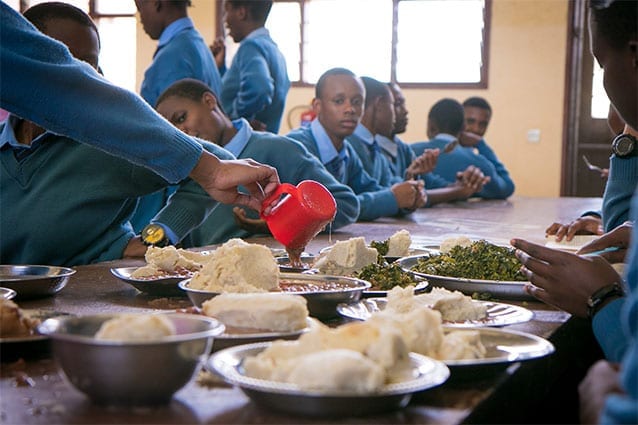
Whilst all students who are offered a place at St Jude’s have the cost of their education and boarding covered, not all of them have sponsors supporting them directly. Those without sponsors have to be supported through donations made to our Unsponsored Student Fund. Though the fund helps to give them an education, they miss out on building a relationship with a sponsor through letters and even visits, and learning about the wider world.
Irene is one of these new Form 1 students and is looking forward to making the most of her new found opportunities at the School. She is also hoping her scholarship will soon be sponsored.
“I am a girl coming from a single parent family. My mother is constantly ill making it hard for her to provide basic needs for the family and support my siblings. Giving me a chance to study at St Jude’s opens a whole new opportunity to end poverty for my family."
“St Jude’s has all the resources needed [for me] to excel academically.
“Sponsors enable the School to provide us with three meals a day, school uniforms, teachers, textbooks, electricity, water and a bed of my own to rest on after a long school day,” says Irene.
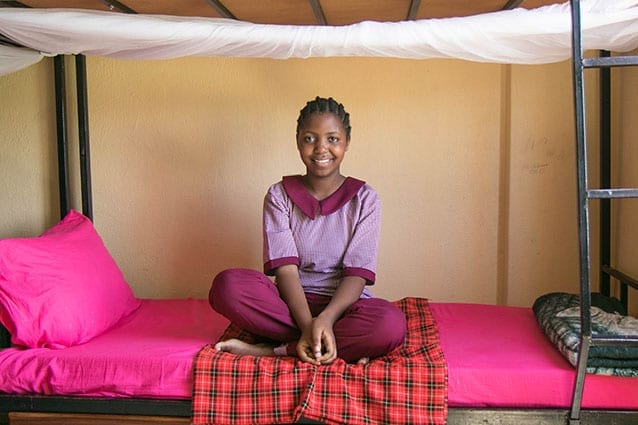
“Without sponsors we cannot study at this school […] being sponsored changes it all.”
Like every student at St Jude’s Irene has big dreams and plans for her future.
“St Jude’s gives me the assurance for a brighter future as I aspire to become an engineer, a career that would give me and my family financial stability.” Thanks to our supporters the sky’s the limit for Irene and the bright young students in Form 1 and they’re reaching for it.
Sponsor a Form 1 student like Irene today and give them the greatest gift you can, a good education. Who knows… you could be sponsoring the next Wangari Muta Maathai (female East African scientist and Noble Peace Prize recipient)! Click here for more information.
When Erick and Prosper took out the top prize at last year’s Science Exhibition, they could not have predicted their success would lead them beyond St Jude’s school gates, let alone across the African continent and over the sea to Europe!
The innovation named, The Use of Mobile Networks as a Fire Alert System, earned them the title of Young Scientists Tanzania 2017. The unstoppable duo have received commendations from world leaders, including Tanzania’s Prime Minister Kassim Majiliwa and Ireland’s President Michael Higgins.
“We are using technology to alleviate problems facing our society and trying to help Tanzania become more advanced in this area. We began with making a smoke sensor, which distributes signals to the mobile phone in the instance of a fire, and when the signals enter the phone, the phone converts it immediately and makes a call to the fire fighters, plus the owner of the house,” Erick explained.
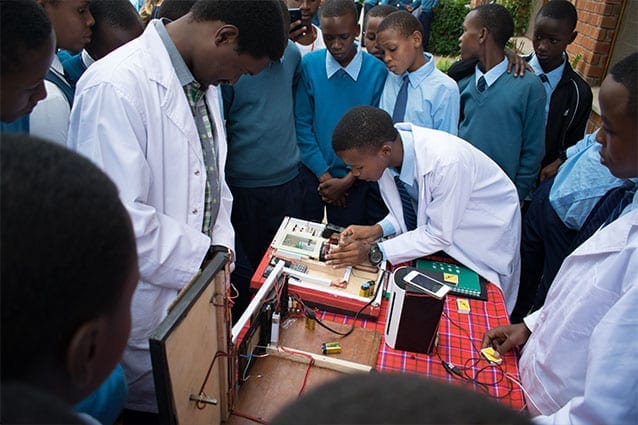
“After reaching first place at St Jude’s Science Day last year, we presented the project at Nelson Mandela University. From there, we were nominated by the university to showcase the innovation at an exhibition in Dar es Salaam.”
“The Prime Minister of Tanzania saw our project and was highly impressed. We then competed in the Young Scientists Tanzania competition and won the overall prize,” Prosper said.
As a part of their prize, Erick and Prosper travelled to South Africa to present their project at the Eskom showcase for young scientists. They then travelled to Ireland, where they presented at the BT Young Scientist and Technology Exhibition, where Ireland’s President Michael Higgins heaped praise on our students and urged all exhibitors to continue pursuing excellence!
“The world depends on the young generation to influence changes in society. It is this generation who are showing enthusiasm and addressing global challenges through sustainable development,” President Higgins said.
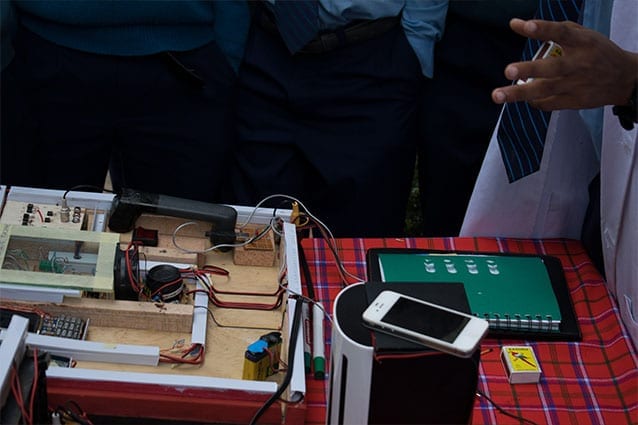
Whilst in Ireland, Erick and Prosper had the chance to meet with company representatives who have worked on similar innovations and were willing to offer advice to Tanzania’s superstar scientists.
“It was a great privilege to be introduced to company officials and visit their organisation, and learn about the latest technological developments,” Prosper said.
Erick, 18, and Prosper, 16, returned to St Jude’s with a spring in their step as Form 4 students this year, determined to inspire their peers and generate enthusiasm for Science Technology, Engineering and Mathematics (STEM) subjects.
“Many students want to know how we reached success. I always tell them, when I first participated in St Jude’s Science Exhibition in 2016 with a different project, I did not participate to win, but to improve. I tell these students to feed their passion. Do not waste time. Never lose track of the future,” Erick said.
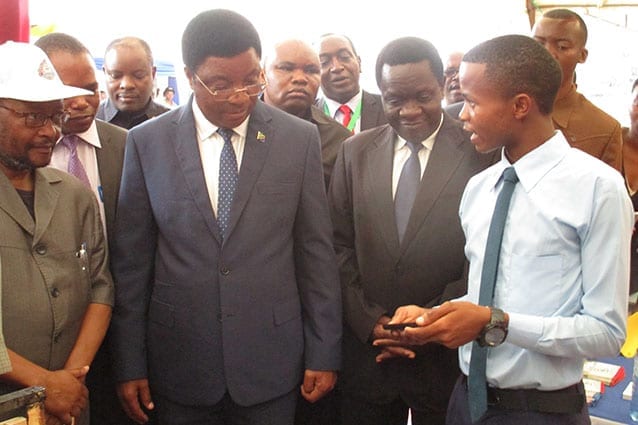
Both Erick and Prosper attribute the foundation of their success to the free, high quality education they receive at St Jude’s.
“When I think about what The School of St Jude has done for me, I become emotional. I am the only person in my family who has travelled abroad and had access to good education. I know I will become a sponsor one day too,” Erick shared.
“This school gives students endless opportunities to achieve their dreams,” Prosper added.
Erick and Prosper are just beginning their journey on the road to success. You could support the journey of the next young innovator! Make a donation to The School of St Jude.
A physics class at Smith Secondary Campus four years ago inspired Eunice to make a difference in a unique and innovative way.
During a lesson about refrigeration in 2013, Eunice conjured the idea to invent a low-cost refrigerator made of commonly used household materials such as tiles, cement and charcoal, for Tanzanians living in rural communities.
“Many people in my own community have enough food, but they do not benefit from it because it starts to decay before they have the chance to consume it, as they do not have electricity. I wanted to explore alternative means of preservation.”
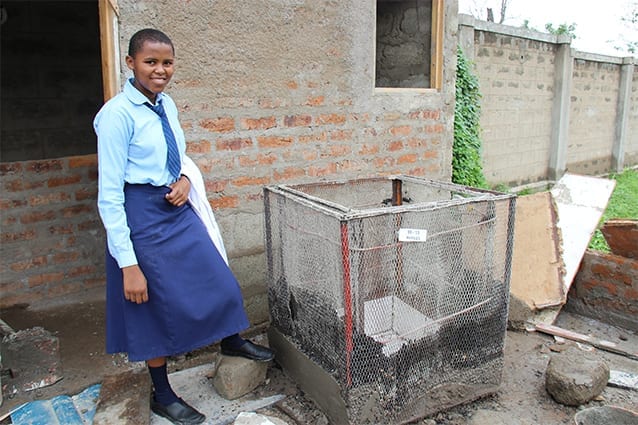
Eunice, currently a Beyond St Jude’s Community Service Year intern in our Purchasing team, spent the remainder of 2013 researching low-cost means of storing fresh food, and launched her project at St Jude’s Science Exhibition in 2014.
Four years later, Eunice’s model has been replicated and people in her community benefit from the innovation.
“A farmer in the community approached me when he heard about the project and wanted to make something similar to preserve meat and milk. I willingly shared my knowledge with him and hope to keep developing my idea so more people can benefit in the future.”
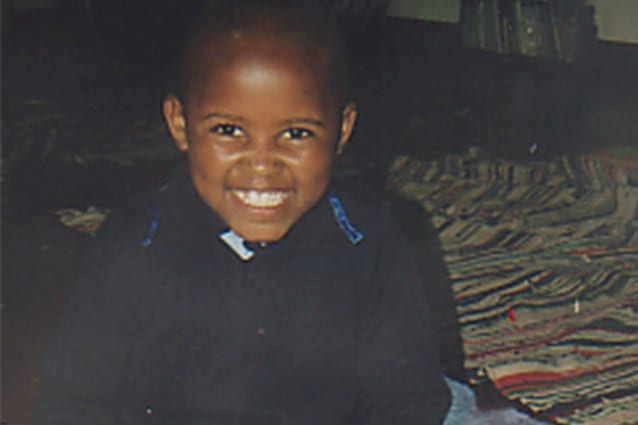
Although the project continues to positively affect the wider community, Eunice had to overcome several challenges in the beginning.
“Many people in Tanzania still assume science is a male-dominated area. People would say to me, ‘you are a girl, why bother working in this field?’” In an age of rapid technological advancement, Eunice faced the unique challenge of justifying why a simple, low-tech innovation was relevant.
“Most people want electronic refrigerators and electricity in their houses. At first, people thought I was too ‘local’, as imported technology is popular among Tanzanians. We as a country are still developing and reaching international standards. However, my project is helping people in need.”
Eunice has been accepted as a MasterCard Scholar through the Mastercard Foundation Scholars Program at African Leadership Academy, to the African Leadership University in Mauritius, where she hopes to study business administration. This will help her to develop and continue improving her innovation.
“Tanzania needs professionals in industry development and agriculture. I want this project to benefit as many people as possible.”
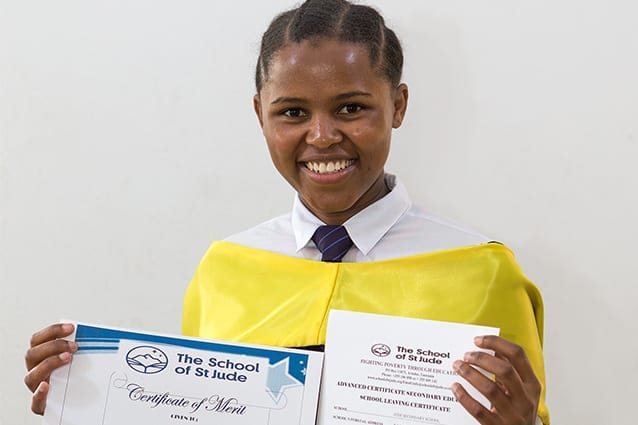
Eunice has proven herself as a future leader, entrepreneur and innovator. Her commitment to serving the community through science sets a positive example for girls and young women!
“Some girls have fears about studying sciences. I remind those girls that science is fun. Science is life. It is the origin of everything we see around us, both natural and human-made.”
Through your support, Eunice is already creating change and improving the lives of her fellow Tanzanians.
Samwel and John in Form 4 have joined the ranks of Eric and Prosper, and are the overall winners of St Jude’s Science Exhibition 2018.
Their invention of a solar panel which tracks and follows sunlight was deemed by the judging panel, comprised of St Jude’s academic staff, to be one of the most technologically advanced they have seen.
Judging criteria was based on potential to positively impact society, environmental consideration, practicality and creativity.
Mr Mcharo, Acting Headmaster and esteemed physics teacher at Smith Secondary Campus, helped launch the first Science Exhibition in 2010. He said he is continually impressed each year with the calibre of entries into the exhibition.
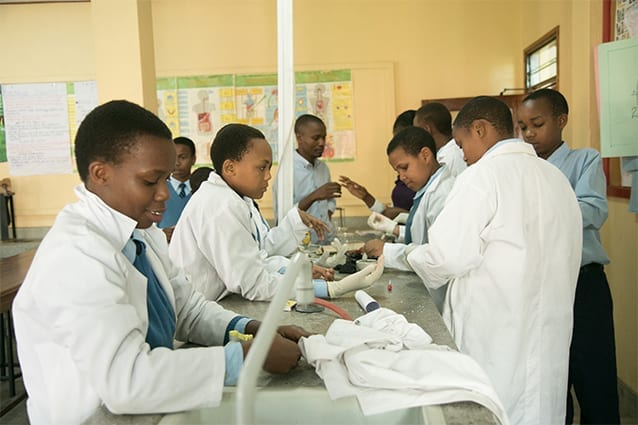
“The most important of any science exhibition is demonstration of skills. We are giving students the chance to demonstrate what they can do out of the classroom,” he said.
Mr Mcharo had the honour of announcing Samwel and John as the overall winners this year.
“They have put a lot of effort and hard work into their project and we look forward to seeing how they progress in coming months. It is possible we may again receive national acclaim!” Mr Mcharo declared.
Samwell and John were overcome with pride when their success was announced in front of an audience of more than 700.
“Before we started, we thought we would just do our best and try to think of a project that will benefit others. This has made us so excited.” Samwell said.
“Both of us hope that companies in Tanzania will take this innovation seriously. Reliable electricity is challenging to access in Tanzania, and our solar panel may be used in many industries as a generator. The battery is charged all day. The panel rotates east to west, meaning it is always catching some sunlight,” John said.
“Through solar tracking, we reduce the costs of electricity significantly, which benefits everyone and the environment” Samwell added.
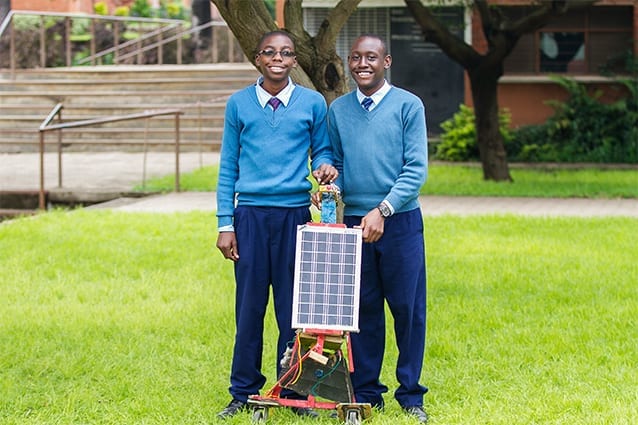
As part of their prize, Samwel and John will be selected to represent St Jude’s at an upcoming science fair at Arusha’s Nelson Mandela University. This opportunity will allow them to expand their knowledge and interact with students and experts working in Science, Technology, Engineering and Mathematics (STEM) fields across Tanzania.
“Undertaking this project has given me an insight into controlling different systems, which will be crucial for me in my future career as a robotic engineer,” John said.
We look forward to updating you with the progress of Samwel and John’s project as the year unfolds, and would like to acknowledge winners in all categories:
1st place: Automatic solar panel track (Samwel and John) Form 4
2nd place: Human waste hair recycling (David and Ojungu) Form 4
3rd place: Land tilling machine (Andrew Lenjima and Amir Rajabu Form 2
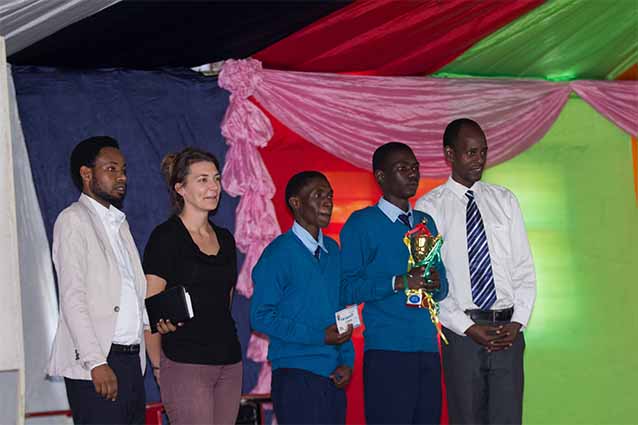
Category winners:
Science (lower primary): Drinking candle (Silvia, Ashura, Suleiman, Arafa, Maria) Standard 2
Science (upper primary): Egg incubator (Bahati, Shamimu, Jaclikne, Gwantwa) Standard 6
Chemistry: Poisons detector (Obadia and Elig) Form 3 Biology: Paper making from grass (Issac and Eliamani) Form 4
Physics: Electromagnetic generator for power saver (Jamal and Ramadhani) Form 2
Mathematics: Maths Games (Hadija, Juma, Benedict, Mulhatat, and Irene) Form 1
Geography: Land conservation and architectural design (Johnson and Ezekiel) Form 3
ICT: Labs inventory management (Francis and Evance) Form 5
Chairman Award: Recycling of plastic materials (Vicky, Irene, Fatuma, Danial) Form 3
Innovative Award (special award): Blind stick and E-book (Angela, Sharon, Juliana and Erick) Form 3
Any of these students may just be the next internationally acclaimed young scientist! Help them on their journey and share their story.
If the last two years are anything to go by, St Jude’s annual Science Exhibition is set to be the birthplace of some of East Africa’s most prominent youth innovations.
Edgar, an International Eco-Hero, Anzisha Prize recipient and winner of The Children’s Climate Prize 2017, launched his plastic recycling project at St Jude’s 2016 event, while Erick and Prosper, Young Scientist Tanzania winners, came first place in last year’s Science Day competition. All three students have represented Tanzania and St Jude’s internationally.
In its eighth year, our recent Science Exhibition did not disappoint. More than 50 creative, surprising and innovative projects were displayed by students of all ages, with dozens of future scientists explaining their inventions to bustling crowds of peers, staff and visitors.
See some of our boldest and best demonstrations!
Human hair waste recycling
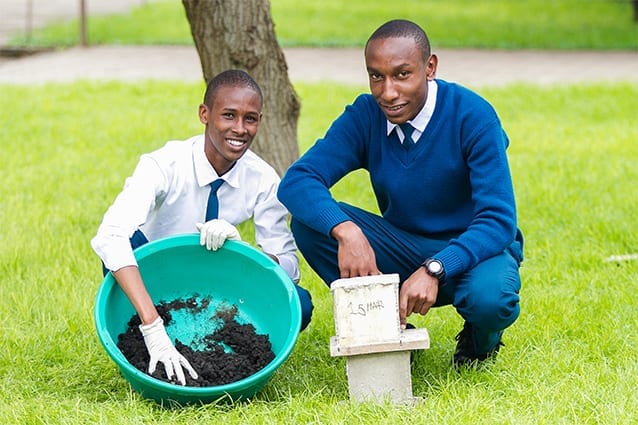
Form 5 students, David and Ojungu, have found an interesting use for hair trimmings! Their creative display showed how human hair can aid the production of herbicides, pesticides and fertilisers, as well as civil construction materials.
“Synthetic fibers are often used to reinforce steel and cement. The creation of these fibers harms the environment — but here, we have shown how human hair, an organic material, works well too!” David explained.
“Ojungu and I were inspired to undertake this project when learning about the compounds of human hair in biology. We certainly aim to develop the project and continue putting it to the test. Also, the nitrogen-based pesticide substance we made using human hair could assist farmers and people in rural areas of Tanzania. We are excited to progress,” he said.
Drinking candle
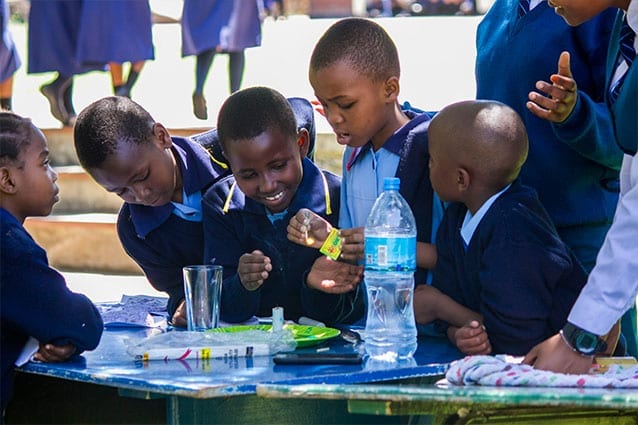
Innovation and scientific intrigue is not limited by age. A standout project on display was curated by six students in Standard 2… with teacher supervision, of course!
Maria, Suleiman, Silvia, Haika, Ashura and Arafa articulately described how coloured water can be absorbed into an upside-down glass with a candle inside, due to air pressure and temperature.
“What we do is pour water on the plate then add red food colouring, and put the candle at the center of the plate, finally light the candle. We then cover the candle with glass.”
“When the candle burns inside the glass, the air inside the glass gets warmer. Warm air takes up more space than cool air. The air inside the glass pushes the glass. Expansion of the warm air causes the air pressure inside the glass to increase. So, water keeps flowing inside the glass until the air pressure inside the glass is the same as the air pressure outside the glass,” Maria said.
Bio-diesel
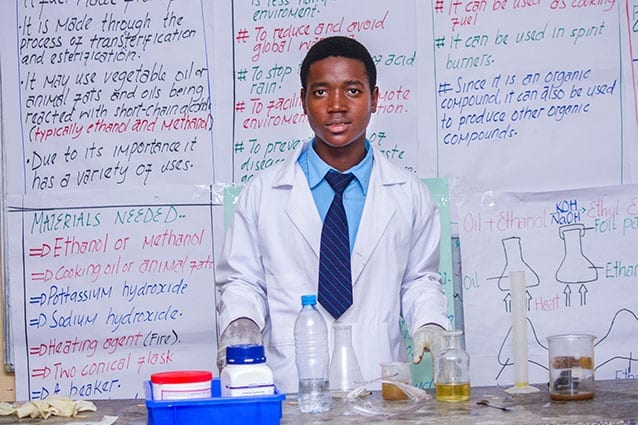
Secondary students, Samwell, Hilda and Eliya created a bio-diesel from locally extracted sunflower oil and ethanol.
“Sunflower comes from sunflower seeds and the ethanol from fermentation of maize, yeast and water. Mixing the ethanol, sunflower oil, potassium hydroxide and sodium hydroxide then we heat the mixture to 210 degrees Celsius. After heating to the required temperature, we get the bio diesel that can be used for cooking, in spirit burners and a substitute of petrol to run vehicles,” Hilda said.
“We believe our project has a positive impact on society. It potentially provides employment through agriculture by growing crops used which are sunflowers and maize. Additionally, the fuel produces less carbon monoxide when burned, reducing greenhouse gases. This prevents global warming, acidic rain and destruction of the ozone layer,” Hilda added.
We are proud of all students who participated in the 2018 Science Exhibition and look forward to seeing the development of these projects as the year unfolds.
If you’d like to see our young innovators in action, come and visit St Jude’s!